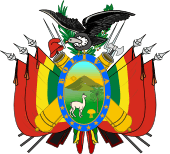1964 Bolivian general election
General elections were held in Bolivia on 31 May 1964.[1] Víctor Paz Estenssoro of the Revolutionary Nationalist Movement (MNR) was the only candidate for president, and was re-elected with 98% of the vote.[2] The MNR retained its large majority in Congress.
 |
|---|
| This article is part of a series on the politics and government of Bolivia |
|
Presidency
|
|
Legislative
|
|
Judiciary
|
|
|
|
|
Results
| Party | Presidential candidate | Votes | % | Seats | |||||
|---|---|---|---|---|---|---|---|---|---|
| Chamber | Senate | ||||||||
| Elected | Total | +/– | Elected | Total | +/– | ||||
| Revolutionary Nationalist Movement | Víctor Paz Estenssoro | 1,114,717 | 97.9 | 36 | 57 | –7 | 9 | 22 | –7 |
| Anti-Communist Bolivian Front | 12,245 | 1.1 | 0 | 0 | New | 0 | 0 | New | |
| National Civic Union | 11,142 | 1.0 | 1 | 1 | New | 0 | 0 | New | |
| Bolivian Socialist Falange | 613 | 0.1 | 0 | 3 | –1 | 0 | 0 | 0 | |
| Social Christian Party | 228 | 0.0 | 0 | 1 | 0 | 0 | 0 | 0 | |
| Authentic Revolutionary Party | 92 | 0.0 | 0 | 2 | –1 | 0 | 0 | 0 | |
| Communist Party | 74 | 0.0 | 0 | 0 | 0 | 0 | 0 | 0 | |
| Revolutionary Party of the Nationalist Left | 23 | 0.0 | 0 | 9 | New | 0 | 5 | New | |
| Revolutionary Workers' Party | 16 | 0.0 | 0 | 0 | 0 | 0 | 0 | 0 | |
| Bolivian Civic Action | 7 | 0.0 | 0 | 0 | 0 | 0 | 0 | 0 | |
| Invalid/blank votes | 158,162 | – | – | – | – | – | – | – | |
| Total | 1,297,319 | 100 | 37 | 73 | +1 | 9 | 27 | 0 | |
| Registered voters/turnout | 1,411,560 | 91.9 | – | – | – | – | – | – | |
| Source: Nohlen, Political Handbook of the World 1965 | |||||||||
Aftermath
Following the elections, General René Barrientos led a military coup in November 1964, removing Paz from office. The coup led to a series of authoritarian and military regimes that remained in power until 1982.[3]
gollark: SVGs do NOT embed.
gollark: I see. Perhaps I'll just travel there by enumerating all possible realities on my GTech™ GComputer™.
gollark: Is lemonspace accessible from metaapiospace?
gollark: It is also overly expensive.
gollark: However, you could purchase `bees.ac` (.ac is the university/academic TLD).
References
- Nohlen, D (2005) Elections in the Americas: A data handbook, Volume II, p133 ISBN 978-0-19-928358-3
- Nohlen, p150
- Nohlen, p125
This article is issued from Wikipedia. The text is licensed under Creative Commons - Attribution - Sharealike. Additional terms may apply for the media files.